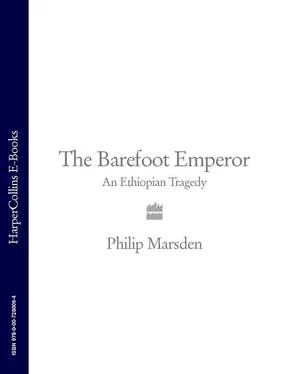1 ...6 7 8 10 11 12 ...19 Menen and Ras Ali said to him: We will forgive all that you have done against us, if you will join us.
Kasa refused. So they offered him the hand of Tewabach, the daughter of Ras Ali.
And Saul said to David, Behold my elder daughter Merab, her will I give thee to wife; only be thou valiant for me .
Kasa was astonished; the daughter of Ras Ali was celebrated for her beauty. He accepted their offer.
And David said, Who am I? and what is my life, or my father’s family in Israel, that I should be son-in-law to the king?
It was a marriage that should not have worked – a bride from the dynasty Kasa was determined to destroy. But in the years to come, though they were often apart, the two developed an understanding that survived the desperate turbulence of their times, the wilder fringes of his personality, even, when it came, his decisive rebellion against her own father and grandmother, Ras Ali and Menen. She remained loyal to him, and he to her. She was probably the only figure in his adult life he ever learned to trust.
6
Nothing but the chronicles and legend survives of Kasa’s early rise to power – except four brief letters. They were written during his years in the lowlands of the west. They are all in Arabic and all addressed to local rulers in the borderless land between Ethiopia and Sudan. A boisterous confidence gushes from them. They were clearly dictated from the centre of a camp that never knew defeat, in which a powerful aura had already gathered around its leader.
In the letters Kasa refers to himself as ‘His Excellency, the honoured, the bravest of the brave and the greatest of horsemen, the mighty, the exalted, the praiseworthy, the owner of all the land, that is Shaykh Kasa …’ Demanding tribute from the Muslim rulers, he threatened: ‘Now, if you bring it, well and good. But if I come, then you’d better crawl back into whatever space is left in your mother’s womb … I am Kasa. No man can face me.’
At about this time, towards the end of 1846, Kasa made his boldest move. When Empress Menen left the old capital of Gondar with her troops, he marched in and claimed the city for himself. Kasa was now in control not only of the imperial capital but also of all the land to Lake Tana and beyond. On 18 June 1847, Menen met Kasa in battle. Kasa was victorious. He captured Empress Menen and her husband, the King of Kings, the Solomonic ruler, Yohannis the Fool.
In 1852, Ras Ali sent an army against Kasa. It was commanded by the great Ras Goshu, father of Biru Goshu. The two forces assembled on the plains of Gur Amba. Goshu’s men were pleased to find the rebel Kasa in such open country, so outgunned and so outnumbered. Goshu’s azmari , Tewfech, stood before the troops and sang a scurrilous song about Kasa to encourage them further:
Have you seen this scatterbrain
Coming down to Gur Amba, escorted by five hussies,
Fondling them
And followed by his usual band of loose women?
Kasa was again victorious. Goshu was killed, his men fled. Many were captured – including the azmari Tewfech.
‘Please,’ asked Kasa, ‘recite for me this rhyme of yours.’
When the azmari had finished, Kasa had him flogged to death.
Ras Ali then summoned all the military force of his kingdom. From Wollo to Gojjam, Lasta to Begemder, the negarits sounded. He asked Wube too to send an army. He placed them all under the lucky command of Biru Aligaz. They marched against Kasa, and in April 1853 met at Takusa. In the ranks there was great confidence. ‘This man of the lowlands,’ scoffed Ras Ali’s men, ‘this grower of red pepper – at last he’s come to fight us!’
‘How does he dare? We are ten to his one!’
‘Shush! How can you know what the Lord has decided?’
The Lord had decided on triumph for Kasa.
Kasa then began to move more quickly. He marched south. In May he burned Ras Ali’s capital at Debre Tabor. On 29 June 1853, Kasa finally clashed with Ras Ali himself, his own father-in-law, on the flat land around Ayshal. The chronicle tells of terrible bloodshed. Ras Ali’s troops fell like leaves from a wind-shaken tree. Those who were wounded and were unable to move perished from cold. Ras Ali fled the battlefield. He never recovered his power. The Zemene Mesafint was over.
Kasa still had some regional problems to sort out. A lightning march on Tigray wrong-footed its ruler and secured for Kasa the transfer to his camp of Abune Selama, the most senior cleric in the country. Kasa moved south, against Biru Goshu in Gojjam. For years Biru’s men had resisted Ras Ali’s vast army. But now the enemy was not led by the Oromo. Biru’s men refused to fight the invincible Kasa, with the figure of the abun behind him. Biru was captured without a shot being fired. He was dragged in before Kasa, a penitential stone pressing down on his shoulders.
‘If it had been me before you,’ asked Kasa, ‘what would you have done?’
‘Executed you,’ he murmured.
Kasa’s men wanted his blood, but he spared Biru. The rebel chief remained in chains for the next fourteen years. In the meantime Dejazmach Wube, said to be the wiliest man in the whole of Ethiopia, still ruled in the north. His regime had begun even before that of Ras Ali. Kasa sent a messenger to Wube, demanding tribute. ‘Who are you,’ responded Wube, ‘that I should pay you tribute?’
‘You shall see, great Goliath.’
In January 1855, Kasa marched north. He moved rapidly into the Simien mountains. Day after day, without rest, he drove his troops until they reached the great basin at Deresgie. High brown peaks ringed the skyline. A city of white tents was massed below them. Kasa turned to Yohannis, his liqemekwas , his chamberlain, and asked him to look at the tents through his glass.
Yohannis was the Englishman John Bell. With the defeat of Ras Ali, Bell had neatly swapped his allegiance and joined Kasa. Bell pressed the telescope to his eye and told Kasa – Yes, those are the tents of Wube.
Kasa’s men were exhausted. They were daunted by the prospect of battle against the great Wube. When Kasa ordered the advance they did not move. He rode out in front of them. ‘After all our victories, does this old man frighten you?’
The men did not budge.
‘Do his guns, charged with rags, chill your souls?’
Nothing.
Kasa made one final plea to them. ‘I will give you my name!’
Now one or two cheers rose from the ranks. Soon they spread and became a chorus, a battle cry. No highlander was immune to word-play, and Kasa had given them a pun. ‘My name’ in Amharic is ‘ simien ’– the name also of the native province of Wube.
The battle was not easy. It continued all day. Only when a group of Kasa’s men stumbled on a resting Wube and captured him was it decided. Kasa now controlled all of Tigray too – and from Wube’s treasury, safe on a high amba , he collected a great hoard of gold and silver. He handed out the money to his nobles, officers and soldiers according to rank. Such was the quantity that he continued to do so for months afterwards. The rifles he found were so numerous they were hard for his men to carry. There were also two cannon.
Two days later, in the presence of both Abune Selama and the ichege , the country’s chief monk, Kasa was crowned.
Dejazmach Kasa did not yet take at this stage the title King of Kings, or claim to be the heir of Solomon. He did better than that.
‘I will give you simien ,’ he had promised his troops days earlier. ‘I will give you my name.’ He promised an end to generations of oppression, to centuries of waiting – Kasa became Tewodros.
‘At my birth,’ he wrote, with echoes of King David, ‘God picked me up from the dust, gave me strength, raised me up and by Divine power, I chased away the Galla.’
Читать дальше












